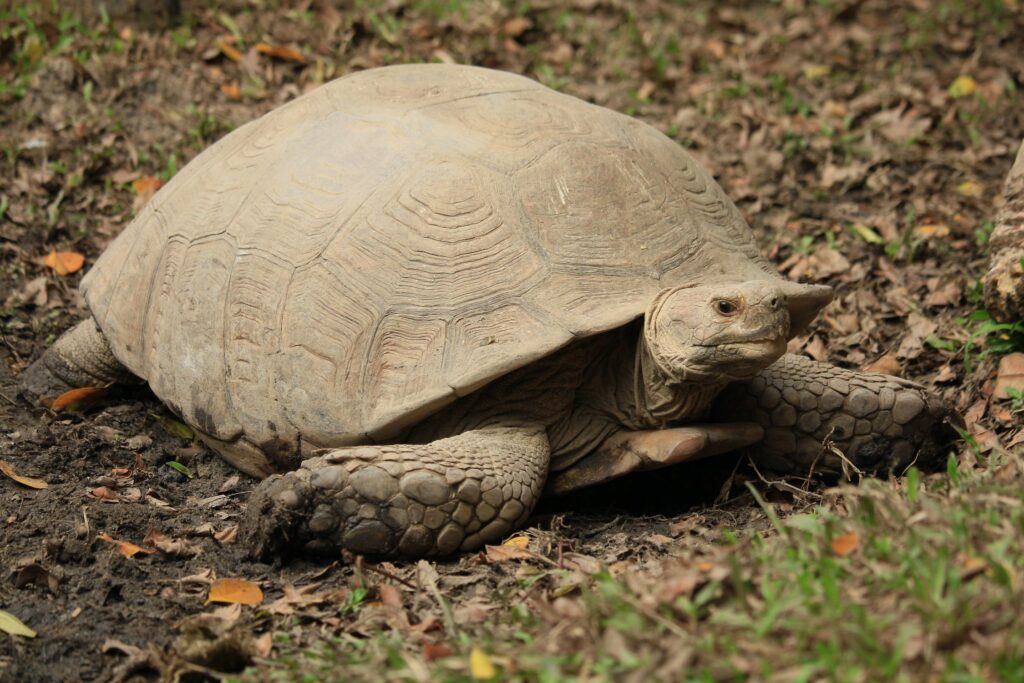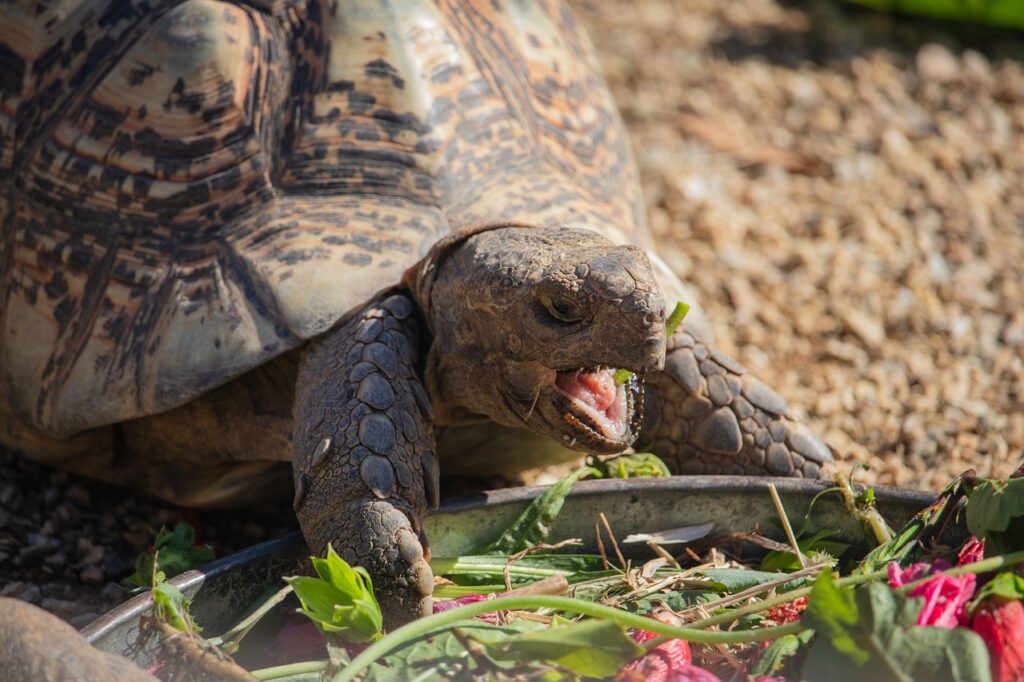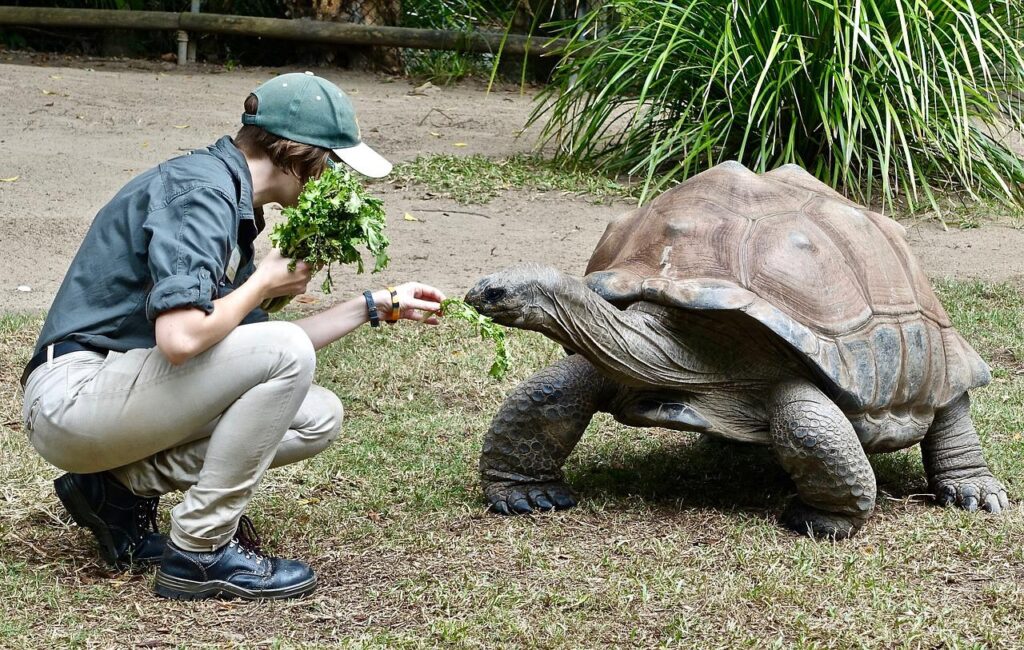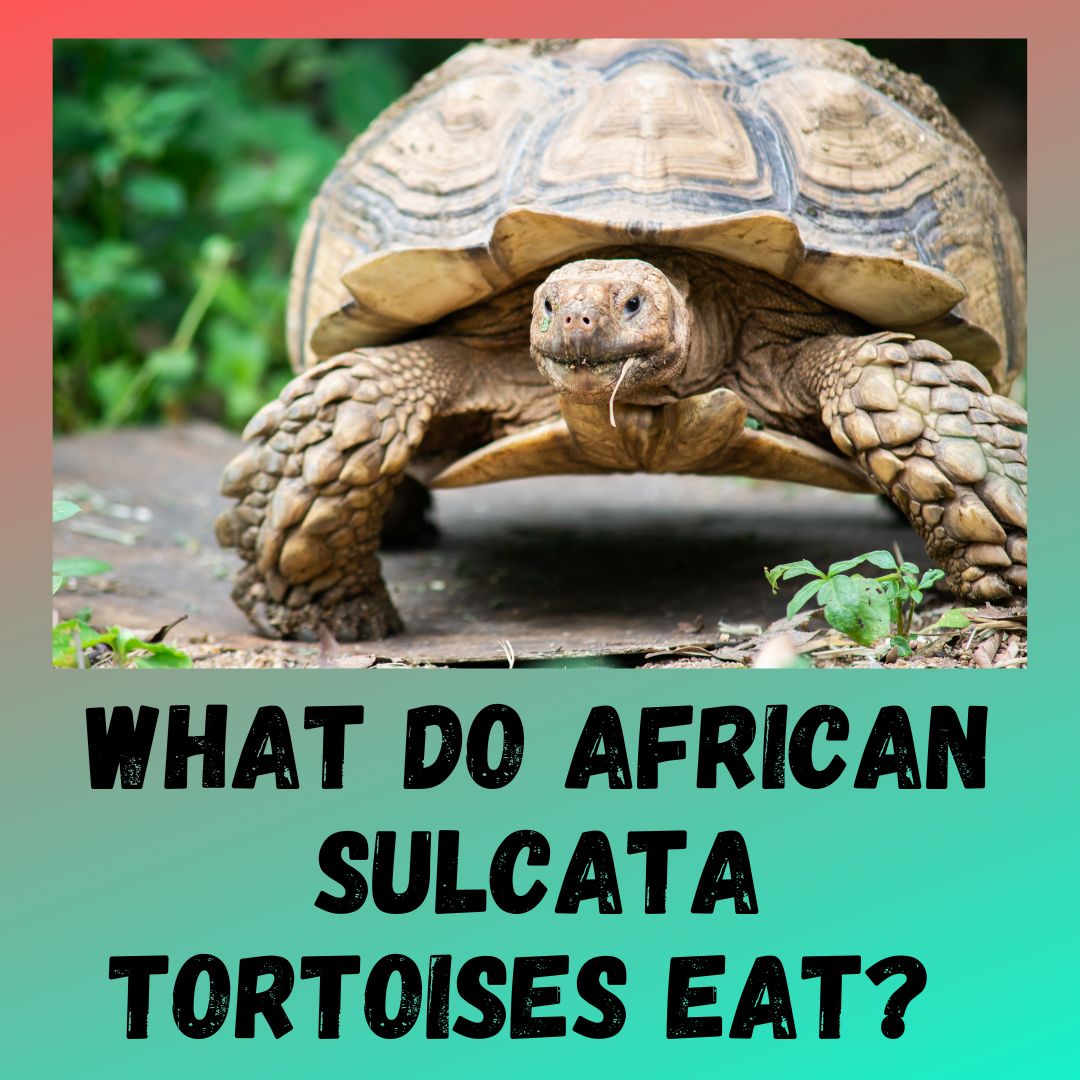Taking care of a pet means that you need to be aware of its diet. Nutrition plays a vital role in a healthy life, which can only be provided by giving your pet the right food.
When it comes to a tortoise, we think that all it eats is grass. However, tortoises can eat various vegetables, plants, and even fruits.
The African sulcata tortoise is a unique tortoise species native to sub-Saharan Africa. As the world’s third-largest tortoise species, special thought needs to be put into what type of diet it requires.
Read on to find the answer to “what do African sulcata tortoises eat?” and more about this unique tortoise species.
Post Contents
About The African Sulcata Tortoise

The African sulcata tortoise is a tortoise species that inhabits the southern part of the Sahara desert in Africa.
These tortoise species also inhabit northern parts of Africa, starting from the southern edge of the Sahara down through countries like Mali, Mauritania, Senegal, Chad, Niger, Sudan, and Ethiopia.
It is the largest tortoise species on the mainland and the third largest in the world. They can weigh up to 200 pounds.
The word ‘sulcata’ is derived from the Latin word sulcus and translates to ‘furrow’. It refers to the furrows on the tortoise’s scales.
What Do African Sulcata Tortoises Eat?
The sulcata’s large size means they must be on a nutritious diet. You need to give it a diet rich in fiber and calcium and low in protein.
Sulcatas are grazers like cows and love to munch lazily along grassy areas. Their diet mainly consists of grasses and hay. Apart from that, they also like to eat vegetables and greens,
Here’s a look into what sulcatas eat, how much they require of each, and what type of occasional treats to give them.

- Grasses And Hay
Sulcatas need to eat grass and hay all the time. About 80 to 90 percent of their diet should consist of grass and hay.
Make sure to give them grass and hay that is not treated with fertilizers or pesticides. A few good types of grass and hay to give sulcatas are timothy grass, orchard hay, Bermuda grass, and clover.
You can also feed your sulcata meadow grass and lawn fescue after ensuring they are pesticide-free.
- Vegetables And Greens
Feeding sulcatas, vegetables and greens are also vital. Examples of vegetables to feed your sulcata are peas, green beans, cabbage, sweet potatoes, carrots, and bell peppers.
Examples of greens to feed your sulcata include lettuce, romaine lettuce, turnip, and dandelion greens.
Limiting feeding your African sulcata tortoise vegetables that have a lot of oxalates is advisable. These vegetables include spinach, parsley, beet greens, rhubarb, and collard greens.
- Fruits
Fruits should not take up a large part of a sulcata’s diet. However, that doesn’t mean you must avoid giving your tortoise any fruits; instead, do it sparingly.
Examples of fruits to feed your sulcata are bananas, strawberries, melons, kiwis, blueberries, peaches, apples, cantaloupes, and apricots.
Take care when feeding your sulcata fruits with pits or large seeds, as these could cause choking hazards.
You must cut the fruits into small pieces so that your tortoise can eat them easily. Dispose of any leftover pieces of fruits to avoid attracting wasps and insects towards these.
- Commercial Pet Foods/ Supplements
There is a lot of debate on whether you should feed your tortoise commercial pet foods and supplements.
“If you are providing your sulcata with all the required nutrients through food sources, you might not need to give it any commercial pet food or supplements”.
However, sometimes you fail to provide all the nutrients your tortoise requires. In such instances, many people depend on commercial pet foods to fill the nutrient gap.
If buying commercial pet foods, buy ones specifically made for tortoises. Your sulcata will love the taste of these and eat them quite willingly.
Regarding supplements, you can feed your sulcata multivitamins twice weekly. You can include calcium supplements in your sulcata’s diet.
- Occasional Treats
Feeding your sulcata treats occasionally is acceptable. However, ensure not to make it a habit, as prolonged consumption of specific foods could cause harm to your African sulcata tortoise.
A popular treat to give your sulcata is cuttlebone. Cuttlebone contains calcium which is an essential component of your sulcata’s diet. Calcium is vital to help your tortoise’s shell grow and stay strong. The shell is its main source of protection from the external environment.
What Are The Foods To Avoid Giving African Sulcata Tortoises
Specific food types, when consumed regularly, could cause harm to your African sulcata tortoise. Here are the foods to avoid giving sulcatas.
- Animal proteins such as fish, meat, or insects
- Citrus fruits such as lemon and grapefruit
- Fruits with pits in them
- Corn
- Rice
Also, avoid giving your sulcata the following foods regularly because they contain oxalic acids. Giving them occasionally is acceptable.
- Spinach
- Broccoli
- Kale
- Cauliflower
- Mustard greens
Plants That Are Toxic To An African Sulcata Tortoise
Some plants are toxic to tortoises. Ensure that your sulcata doesn’t have access to these plant types. You can do a quick check on your surroundings to confirm this.
Eating toxic plants can cause serious illnesses and even death in tortoises. If you suspect your tortoise has eaten toxic plants, consult a veterinarian immediately for appropriate treatment.
Monitor your sulcata for abnormal behavior that might indicate that it has consumed something toxic.
When To Feed An African Sulcata Tortoise
You can allow your sulcata tortoise to graze in the meadows or out in the field, and it will eat grass and hay as much as it wishes to. Apart from that, you need to provide it with other foods given above, a few times a week.
If your sulcata is indoors, you need to feed it a pile of foods as big as they are daily. You can use any of the approved foods given above.
Ensure that your sulcata has access to freshwater anytime during the day. Water is essential for tortoises.

Common Dietary Problems In African Sulcata Tortoises
Feeding your sulcata nutritious foods is essential to its health. Failure to give it a balanced diet can affect its lifespan. Below are the common mistakes people make when feeding a sulcata tortoise.
- Not allowing unlimited access to grass and hay.
- Feeding foods low in fiber and calcium.
- Feeding foods high in proteins.
- Feeding sugary foods and fruits frequently.
- Feeding foods high in phosphorus.
- Feeding foods that are rich in oxalic acids.
- Not allowing unlimited access to water.
- Overfeeding.
Health Issues Of African Sulcata Tortoises
Sulcatas can have various health problems. The most common issue in sulcatas is poor diet. Apart from this, they can also have health issues because of the environment and living conditions.
The following are the common health issues that sulcatas face.
- Calcium deficiency in sulcatas can lead to shell softening and metabolic bone disease. Feed your sulcata foods rich in calcium and ensure it has access to sunlight to avoid this health problem.
- A high-protein diet can lead to the pyramiding of the shell. It can also lead to uric acid buildup in the bladder, which is life-threatening due to urinary obstruction. Feed your tortoise a low-protein diet to avoid these problems.
- Respiratory disease could lead to discharge from the eyes or nose and noisy breathing. Access to proper living conditions and a pollution-free environment will prevent this issue.
Keep an eye out on your sulcata to detect any abnormal behavior. If your tortoise is not eating, is overly lethargic, or displays other signs of illness, have it evaluated by a veterinarian with experience treating reptiles.
When tortoises are sick for an extended period, they could develop kidney and liver damage. This damage could be irreversible and needs to be evaluated as soon as possible.
The vet might recommend taking tests, including radiographs and bloodwork, to assess overall health and direct towards appropriate treatment.
Wrap-Up
African sulcata tortoises primarily eat grass and hay, essential components of their diet. Apart from that, they also consume vegetables and leafy greens. You can also feed them fruits and pet foods in moderation.
Occasional treats are also acceptable; however, don’t make it a habit. Also, avoid giving your sulcata foods that are high in oxalic acids.
Finally, let your sulcata have unlimited access to water and enough exposure to sunlight.
Frequently Asked Questions
How Often Should You Feed An African Sulcata Tortoise?
Feed your African sulcata tortoise grass and hay every day, along with a few of the approved vegetables and greens. Limit feeding it supplements and pet foods to a few times a week.
What Are African Sulcata Tortoise’s Favorite Foods?
African sulcata tortoises love to feed on grass and hay.

94% of pet owners say their animal pal makes them smile more than once a day. In 2007, I realized that I was made for saving Animals. My father is a Vet, and I think every pet deserves one. I started this blog, “InPetCare”, in 2019 with my father to enlighten a wider audience.
